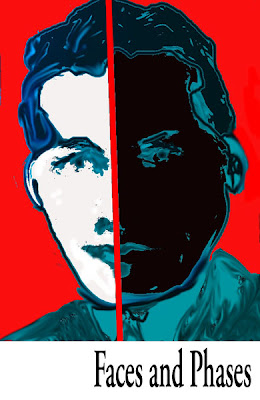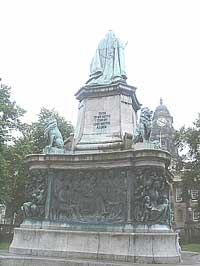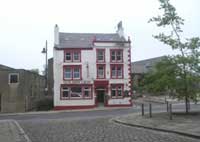The Ruxtons
(A Drama About A Lancaster Othello)
Red stains in the sunset,
Red stains on the knife,
Old Dr. Ruxton you murdered your wife.
The maid came and caught you,
You murdered her too,
Now Dr Ruxton what are we to do?
They'll hang you tomorrow,
They'll not spare you 'tis sure,
And then Dr Ruxton will murder no more.
Red Stains on the carpet,
Why Dr. Ruxton did you murder your wife?
Those were the verses on the broad-sheet which was circulated when Dr. Ruxton was tried, at Manchester, in 1936.
The Trial
For the Defence: Norman Birkett K.C.
For the Prosecution: Mr. Jackson K.C.
The Judge: Mr. Justice Singleton
The Deceased: Isabelle Ruxton, wife of the accused.
Mary Rogerson, the live-in maid.
Other Victims: The Three Orphaned Ruxton Infants.
The Evidence: Circumstantial.
Important Witnesses:
Forensic Professor Glaister
Lancaster's Chief Constable Vann
Dentist, Lovers? Friends, Trades People and Employees of the Ruxtons
Inside and outside the court, in the pubs, on the doorsteps and in the market a cast of thousands of Lancastrians, all with a story to tell, or rumours to spread, about the strange goings-on of Buck and Isabelle Ruxton and the tragedy of the murders.
Buck Ruxton, described in the local press as a Mohammedan, of mixed French and Indian blood, was an exotic figure in a Lancaster unused to seeing people other than whites, all speaking with the distinctive local or regional accent.
Curiously, Gordon's wife, British but Welsh-born, had been seen as a weird foreigner when she first moved to Morecambe. She had been humiliated by her teacher, because of her accent, and ridiculed by some of her class-mates at Balmoral School, when she first arrived. Perhaps they thought that she was Irish, who were all, usually without justification, disliked and distrusted.
Nobody worried about Dr. Ruxton's background. With over two thousand patients on his panel, cheap fees, pleasant bedside manner, many friends amongst the workers he served, Buck Ruxton quickly became something of a local hero. He claimed to be the most progressive doctor in the area and the only people who disliked him were some of his colleagues, rivals for panel patients. Maybe, he exaggerated when boasting of his medical prowess but there was some truth in his extravagant claims. Certainly, he had the trust of his patients.
The Watsons had plenty of reason to be grateful to him. He had delivered their two children safely and skilfully despite two difficult births.
"Best doctor in the world!" was Margaret's verdict.
His care of their little, delicate Gwyn, during the first winter of her life, was meticulous and affordable. The doctor had never given up when Gordon and Margaret had despaired and begun to think that the child had no hope of surviving something very close to the dreaded pneumonia.
Soon, he was to be fighting for his own life. Although both of Watsons thought that he was probably guilty, they did not want him to die. But why had he killed the housemaid? That was not easy to understand or forgive.
Rumours had been rife in Lancaster about "goings-on" amongst some of the local Authority figures. The finger was pointed at Bobby Edmondson, a solicitor in the Town Clerk's Office. Many believed that he and Isabelle had been having an affair.
A bizarre rumour even suggested there had been a lesbian relationship with Bobby's sister, Barbara. "Why did they have rooms next to each other when they went as part of a group to Edinburgh for a weekend?"
There were dark hints about "Isabelle's masculine looks and thick ankles! Farcical fantasies were on many gossips' lips.
Mixed parties, including Isabelle, visiting places like Edinburgh and Blackpool were known about and viewed with intense suspicion. There were many witnesses, like Gordon, who had seen Buck beside himself with rage, after his wife had returned from one of her jaunts. She liked going away without him for a weekend and often stayed out late at night. Twice, she sought police protection after he had threatened her life during one of his jealous rages.
Lancaster Footlights, in China Street, was under suspicion.
"Actors are a funny lot, aren't they? Wasn't Isabelle Ruxton an active member there?"
Someone else said that their brother-in-law's brother's wife's sister was a waitress at the Conservative Club in Church Street. The distant relative of the rumour-monger had allegedly worked in a noisy mill and could lip-read. She said she'd observed two prominent local Freemasons discussing some of the disturbing evidence against a local solicitor. She insisted she'd seen them agree that any nasty publicity, arising from the murder case, could be held back with the help of a few weird handshakes and a nod to the judge.
People reported mixed bathing, cavorting and assignments at Cable Street Baths.
Afterwards, Isabelle was seen going home in another man's car!
There were dozens of reported sightings of the Ruxton or Edmondson car, parked at the end of lonely lanes or on quiet sea shores.
If only a fraction of the stories came to poor Buck's ears, it must have driven him to distraction because he loved Isabelle dearly. Certainly his outbursts from the dock were very convincing. He stated again and again that he was being victimised by the police.
The remains of two bodies had been found in a ravine in Scotland, wrapped in pages of a newspaper which had had a limited edition circulated in the Lancaster and Morecambe area.
Who were the missing persons from that area? Isabelle and Mary!
Forensic evidence, and new methods used to identify victims, proved that the body parts were the two women's.
Blood in the drains at Ruxton's! Bloody clothing burned there! Bloody carpets incinerated! Dustbins filled with bits of burned fabric! Bloodstains here and there in the house! Employees bore witness to a variety of frenzied and prolonged efforts to dispose of what might have been evidence.
The theory was that he had probably strangled one and stabbed the other victim. Using his surgeon's skills, including removal of some finger-tips, to prevent identification by finger-prints, he had cut the bodies up, using ordinary household knives, parcelled them, put them in the boot of his car and driven to Scotland, thrown the parcels down a ravine and driven back to Lancaster at breakneck speed, anxious to establish an alibi.
Dental evidence helped to establish that Isabelle and Mary were definitely the victims.
Chief Constable Vance had sat in the Police Station on one side of Dalton Square. Buck Ruxton had sat in his house directly opposite. The Police Station was fully visible from the Doctor's House. The detective could see the lights on late at night at Ruxton's. Dalton Square was like a stage with characters in a life-or-death drama. The main players strutted across it, playing their roles of hunter and hunted. Both used their considerable brain-power, trying to outwit the other. Both pondered the lack of concrete evidence. The new art of detection using a forensic expert was to be crucial.
Vance ordered sudden action and accompanied unexpected visits to the Doctor's House and searched everywhere thoroughly, even taking the floorboards up.
Anxious and restless, Doctor Ruxton crossed Dalton Square, visited the Police Station and said, "Look here Vann, haven't you found my wife yet? It's outrageous. They're trying to say these two bodies in Scotland are my wife and Mary Rogerson. It's ruining my practice. You must stop the newspapers from publishing such lies."
"What makes you so sure it isn't true, Doctor?" asked Vann.
"Well, here it says the younger of the two dead women, found in Scotland, has a full set of teeth in the lower jaw and I know from my own knowledge that both my wife and Mary Rogerson had teeth missing."
Slowly but surely, convincing circumstantial evidence was building up against the doctor. The police became convinced that he was guilty and that it could be proved.
Vann spoke to his men, "I think it's time we had him over here again."
Detective Inspector Bill Thompson agreed, "I think chummie across the Square is getting a bit desperate. Take care! Remember he has a revolver in that house, sir."
Vann picked up the 'phone, "Doctor Ruxton? Vann here. Those newspaper stories you complained about. I think we can put a stop to that sort of nonsense. Why not come to see me tonight?"
Buck rushed across the Square again, for another of their little chats, each man wary of the other, trying to detect what was in the other's mind.
The Doctor protested that he was the victim of jealous professionals. Lancaster's middle-class was ganging-up against him. Many workers, especially amongst his patients, believed his loud protestations of innocence and agreed with his objections, that he was being persecuted on very little, or no evidence. He had lots of letters of support from local people.
Gordon and Margaret read the notice on his surgery door, in the middle of October.
"To all my patients.
I appeal to you most humbly to remain loyal to me in this hour of trouble. I am an innocent victim of circumstances. Please do not leave my panel list as well as private list. My deputy will conduct business as usual.
Thanking you in anticipation for loyal support.
Signed,
B. RUXTON."
Many did stay loyal to the accused. For a time, Margaret went along with Buck's conspiracy theory. She thought he was the scapegoat, that there was a cover-up. It was Them behind it and they were getting at one of Us.
Gordon wasn't so sure, "You didn't see his face that night when I went for him to help you. He was out of his mind."
"It doesn't follow he really meant to hurt her," she said. "Anyone can lose their temper. You said he soon calmed down."
"Maybe only because he saw me standing there, watching him."
Chief Constable Vann had Buck arrested at five o'clock one morning, convinced that he'd got his man. There was plenty of sympathy for him in the town but all the evidence was against him during his police court appearances in Lancaster.
After his arrest, the kitchen staff of the cafe, where he had often eaten, sent a message with a meal he was allowed in the cells, "Good luck from the kitchen staff."
He wrote back on the serviette, which came with the food, "Thanks for the wishes and luck. It is surely coming my way, B. Ruxton."
During his trial, at Manchester, he took the oath on the New Testament although he was thought to be a Mohammedan or Parsee. He was said to be calm until he went into the witness box at the Assizes.
His relaxed manner was not to last. It was reported, "I most devoutly hope that I shall never again see a man or a woman or a child behave as Doctor Buck Ruxton did during the hours of his examination, cross-examination and re-examination. He cried, was excited, voluble, almost hysterical. Denunciations poured from him like water bursting out of a dam. Then he would beg forgiveness for his bad behaviour in court. His voice varied from beautiful modulation to shrieks."
When Professor Glaister maintained that he should never have worn the dirty suit which he wore during confinements, he shook with rage and beat his hands up and down in anger.
"I can only give one answer. Out of 230 confinements in Lancaster, Doctor Ruxton has never given a death certificate. You can verify that from the L.C.C. Authority. I will give £500 for it. I go by results, not theories. 230 cases and not a death certificate given!"
It was a remarkable demonstration of his professional pride. Sometimes he addressed Professor Glaister as , "Dear fellow" or "valued colleague". Next, he was protesting that everything and everyone was against him.
He pleaded with the judge to forgive his outbursts with, "I am sorry, very sorry sir. It is my fault. But I am fighting for my life. FOR MY LIFE! I must humbly, most humbly, beg your pardon for interrupting."
The report went on, "It was terrible to see an educated man go through such an ordeal and I pitied him."
He stated that he would have had to drive at over 100 m.p.h., on dangerous roads, to dispose of the body-parts in distant Scotland and be back by the hour he was next seen in Lancaster.
Just before and during the judge's summing up, his left arm was doubled on his knees, his face was cupped in the palm of his right hand. At one stage he even yawned, feigning boredom. The judge emphasised that any doubt must go to the prisoner.
The jury returned after an hour. Guilty! Was their verdict. The judge sentenced him with the words, "You have been convicted on evidence which could leave no doubt in the mind of anyone."
Ruxton seemed dazed and beaten. He muttered to himself. He smiled and nodded.
The judge pronounced a sentence of death.
Surrounded by four warders, Ruxton raised his right hand and said, "Don't fuss. I am alright. Don't fuss!"
There was a petition for clemency in Lancaster. More than 16,000 signed it.
One patient expressed the general feelings for the man, "Ruxton was clever, generous and helpful and I cannot but join in the general sympathy for him despite the fact that he has been proved guilty of a very terrible crime."
The fingers were still being pointed at Authority, "He was never allowed access or facilities at Lancaster Royal Infirmary."
His well-known adoration of his and other people's children was mentioned by many. People wondered what would become of his poor little children. After his execution, it was said that they went to the old workhouse, then to Buck's parents or were adopted. No-one knew for sure but their ordeal must have been terrible.
His trial had lasted 11 days in March, 1936. In the May, he was hanged by the neck until he was dead in Strangeways Prison, Manchester. It was stated that before his execution he admitted that he was guilty of the two murders.
The day after Buck was hanged, Gordon met his best friend Brian Howson. Brian had a black eye.
"Who gave you the shiner?" asked Gordon.
"Got into an argument about whether Buck Ruxton should be hanged. Bloke disagreed with me. He came on strong about him being a nasty, filthy wog. I said my bit back. And the bloke hit me. Bloody Fascist!"
The arguments, rights and wrongs of the case, raged for years in Lancaster. Amongst many, there remained an uneasy feeling that there were things going on in their town which only a few were privileged to know about.
Yes, he was guilty all right, but he'd been treated badly at times by some of his own colleagues and others in their circle. He had definitely been very severely provoked by his wayward wife.
Web Links
• A tour of Buck Ruxton's House on virtual-lancaster
• A newspaper article in The Guardian on the Natural History Museum’s forensic entomologists on their role in solving murders revealed that the Museum holds the Ruxton maggots, vital evidence in one of the most celebrated murder cases of the 20th century that convicted Dr Buck Ruxton of the murder of his wife and the family maid.
• Glasgow University Archives holds the Buxton Case File [Ref. GUAFM/2A/25] which contains notebooks, correspondence, anatomical reports, witness reports, extracts from Ruxton’s diary, photographs, and lantern slides relating to the legal case. The material forms part of the important Glasgow University forensic medicine resource whiich contains a wide range of research material relating to a variety of fields including the history of medicine, criminology, sociology, and medical ethics. The records consist of teaching materials, correspondence, press cuttings, personal papers, photographs, and detailed case notes relating to some of Glasgow and Scotland’s most notorious crimes.




